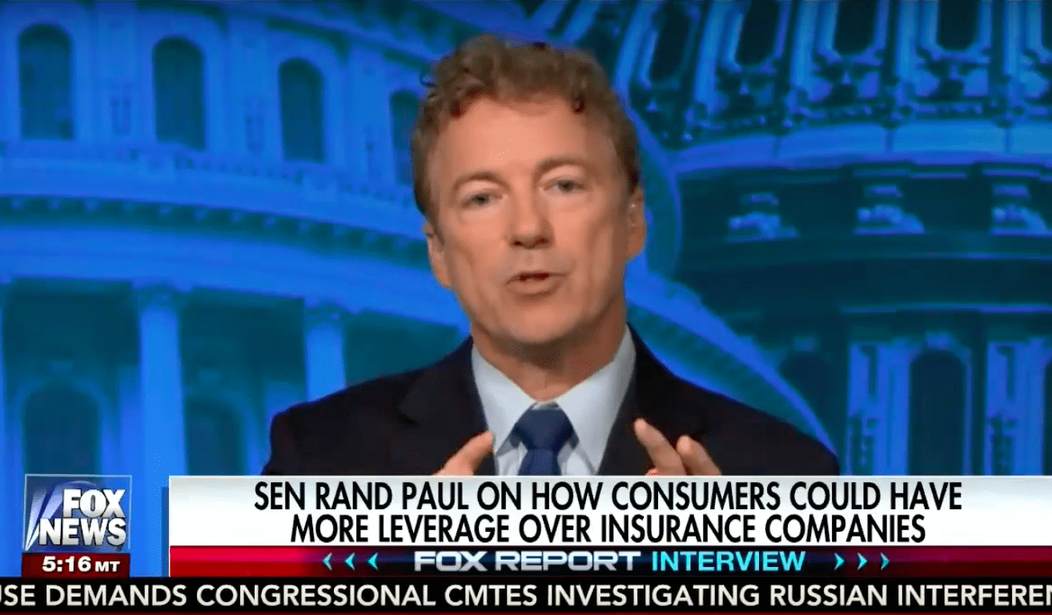Senator Rand Paul is still waiting to see an official copy of the GOP Obamacare replacement bill and says he will not vote for “Obamacare lite.”
“I want a free-market replacement with more power going back to the individuals,” he told Fox News on Sunday. “Some Republicans want to keep parts of Obamacare, and I’m not going to vote for that.”
Paul tore into his colleagues last week when a draft of the bill was released to a media outlet before senators had seen it. “This should be done openly and in public,” he said at the time. “Conservatives who don’t want Obamacare lite should be allowed to see the bill.”
The senator said the GOP replacement bill was being treated as if it were some kind of national secret. “That’s wrong,” he said.
Paul’s doubling down, saying he refuses to vote for a bill that is not a true free-market replacement. The bill that’s coming out of the House, he says, falls short of that goal.
It includes new taxes on health insurance. It includes an individual mandate. Instead of paying the penalty to the government, you’ll have to pay a penalty to the insurance company. It also includes a new entitlement. This new entitlement may be bigger than the Obamacare subsidies. That needs to be debated because many conservatives in the House and Senate were not excited about Obamacare Lite. We want to repeal it.
“I will not settle,” Paul said in a statement, “and I will not stand idly by while the American people are kept in the dark. I will continue to speak out for full repeal.”
The senator might have an uphill battle to make that happen, not only among his colleagues, but the American people. According to recent polls, most Americans are opposed to a “full repeal” of Obamacare. A McClatchy-Marist poll found that 67 percent of those polled don’t want full repeal. According to Rasmussen, most Americans (56 percent) want Congress to make improvements to the law, not repeal it entirely. Only 30 percent of likely voters think Congress should repeal the entire health care law and start over. That’s down from a high of 40 percent in November.
Paul recognizes this divide in the country, which is why he says there needs to be repeal and replacement at the same time, though not necessarily in the same bill. “Republicans are united about repeal,” he says, “but we’re not united about replacement.”
Like other conservatives in Congress, Paul wants to make the case to the American people that there is a better, free-market way to get what they want. They don’t need to keep parts of Obamacare to ensure lower costs and coverage of pre-existing conditions. There are solutions independent of government intrusion. To that end, Paul has proposed his own bill that will get government out of the way and make healthcare affordable.
One part of his proposal is to use association health plans to empower consumers so they have more leverage against insurance companies.
In my replacement bill, we let every individual join an association. So, let’s say, for example, you’re a member of a credit union. In my state, 700,000 people belong to a credit union. They could all join a health association. Then they would have the leverage of having one person negotiate for them—700,000 people buying insurance, one negotiator. They’ll get a good price. They’ll get guaranteed issue. They won’t get dropped, and if their family member gets sick their rates won’t go up because they have leverage.
An association, Paul says, protects you when you have pre-existing conditions. “An association plan is a group plan, so not only will you get the leverage to get a lower price, you will also get guaranteed issue, you won’t be dropped.”
The advantage of this plan is that there are no government costs requiring high taxes. There is no mandate of any kind. Those who are very sick and can’t afford high medical bills will be covered by Medicaid, which has worked in the past. Those who are sick and poor don’t need health insurance, they just need us to pay for their healthcare, he says, and we can do that through Medicaid.
Paul introduced his free-market Obamacare Replacement Act (S. 222) in January, and it just might be the solution many people are looking for. The bill accomplishes what Obamacare failed to do: empower Americans.
They can “1) Choose inexpensive insurance free of government dictates; 2) Save unlimited amounts in a health savings account (HSA) and have wider options for using those funds; 3) Buy insurance across state lines; and 4) Join together in voluntary associations to gain the leverage of being part of a large insurance pool.”
His bill also authorizes a tax credit for individuals and families to contribute to health savings accounts.
Allowing the use of HSA funds for insurance premiums will help make health coverage more affordable for American families. Furthermore, allowing HSAs to be used for a broader range of health-related expenses will give Americans the ability to afford the OTC drugs, dietary supplements, and nutrition and exercise programs to help maintain a healthy lifestyle and prevent chronic conditions.
Americans will be able to deduct their healthcare insurance costs from their income and payroll taxes. This will enable them to buy insurance on their own and not be dependent on their employers.
Paul also includes something for physicians by allowing them to “negotiate for higher quality healthcare for their patients” and “to deduct a portion of the costs incurred from uncompensated care.”
The senator says he hopes repeal happens in the next week or two. He also thinks there will be a vote on replacement, but he will not be on board if the bill doesn’t truly empower Americans with free-market solutions — solutions that offer lower costs, freedom in healthcare choices, and coverage for pre-existing conditions.









Join the conversation as a VIP Member